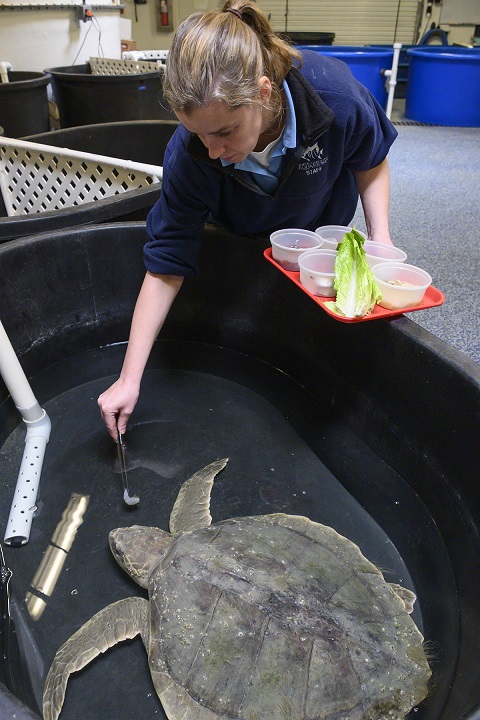
Last week central coast of North Carolina saw dozens of cold-stunned sea turtles needing rescue and rehabilitation.
The North Carolina Aquarium at Pine Knoll Shores received 23 cold-stunned green and four Kemp’s ridley sea turtles from the area, and Cape Lookout National Seashore rangers recovered more than 100 turtles.
Supporter Spotlight
Sea turtles are cold-blooded and their body temperature is determined by their surroundings. When a turtle senses the changing temperature, it will typically head for warmer waters, but if they don’t leave, or if the temperature drops too fast, the turtles become lethargic and unable to swim or fend for themselves, aquarist and sea turtle specialist Michele Lamping explained.
“The waves and wind can push them onto shore, and they can be severely injured or die,” she said.
“Our area had a large cold-stunning event last Thursday,” said Lamping. The aquarium received several green turtles from a variety of areas nearby and a large group was recovered by rangers on Cape Lookout.
“One loggerhead and over 100 green sea turtles were recovered from Cape Lookout National Seashore. Seventy-four of this large group were alive upon arrival at Center for Marine Sciences and Technology in Morehead City, where they received physicals and initial treatments Thursday evening,” Lamping said. “Most of the rescued turtles are juvenile green sea turtles, but there are a few Kemp’s ridley turtles, as well. They were caught in cold water temperatures near shore, unable to swim to warmer waters due to a hypothermia-like response.”
The turtles were relocated Friday to rehabilitation facilities at the North Carolina Aquarium at Fort Fisher, which is caring for 15 sea turtles, and the Karen Beasley Sea Turtle Center in Surf City that is caring for the majority.
Supporter Spotlight
The Sea Turtle Assistance and Rehabilitation, STAR, Center at the North Carolina Aquarium on Roanoke Island has been caring for 178 turtles from a large cold-stunning event few days prior and sent Friday four turtles to the Pine Knoll Shores aquarium.
“Four of our critical cases went to the Beasley Center, and we received three more new standings (two Kemp’s and one more green),” said Lamping. “On Sunday four of the greens were sent back out for a release.”
As of Tuesday, the Pine Knoll Shores aquarium is caring for 27 cold-stunned turtles.
Upon arrival, the veterinary team checks the sea turtles for pneumonia and any injuries, said aquarist John Mauser.
“The care team slowly warms up the turtles, and makes sure they can swim, lift their heads out of the water to breathe, and eat,” said Mauser. If they can’t eat, the team will provide fluids, so the turtles won’t dehydrate.
Aquarium staff and veterinary teams monitor the turtles place a microchip tag in each one, in what would be the shoulder area of the sea turtle. The chip can be scanned and, if the turtle ever re-strands in the future, information for that turtle can be retrieved.
Once the turtles are healthy and have a final veterinary check, they are ready to be released offshore to warmer waters. The release crew tries to find temperatures as close to 70 degrees as possible when releasing the turtles.
The North Carolina Wildlife Resources Commission is leading the effort to rescue and rehabilitate sea turtles and working with the North Carolina Aquariums and Jennette’s Pier, Center for Marine Sciences and Technology, North Carolina State University College of Veterinary Medicine, Cape Lookout National Seashore, Karen Beasley Sea Turtle Rescue and Rehabilitation Center, Cape Hatteras National Seashore, Hatteras Island Wildlife Rehabilitation, U.S. Fish and Wildlife Service, National Oceanic and Atmospheric Administration and National Marine Fisheries Service.







